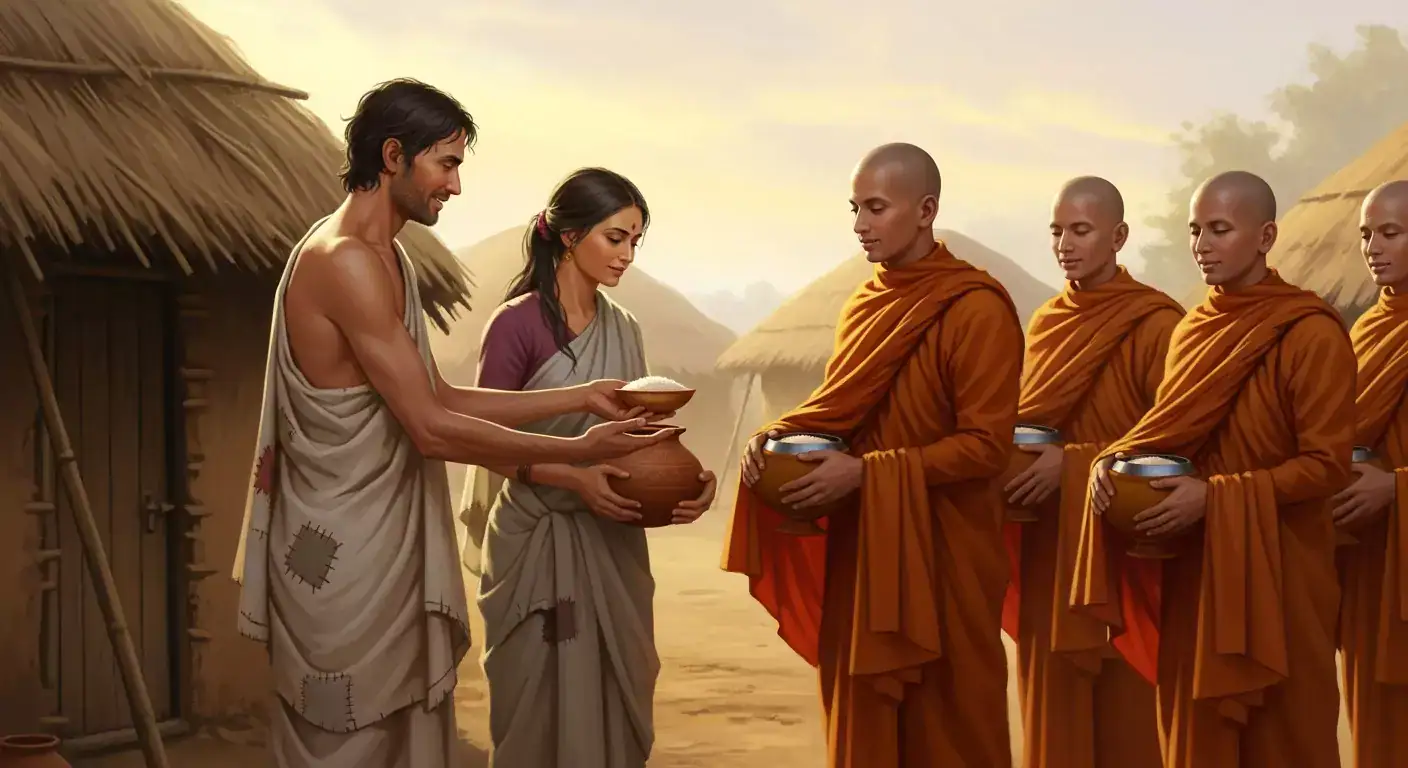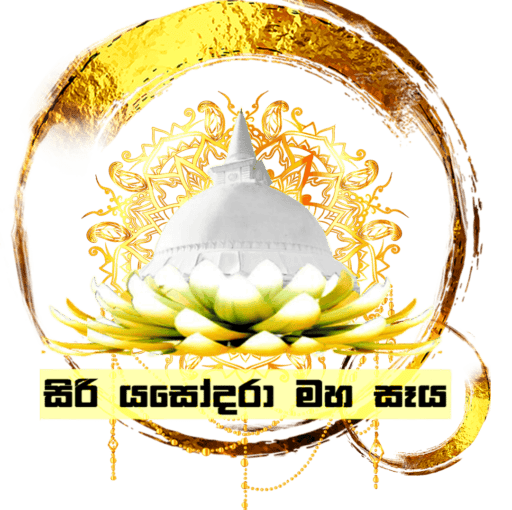KUMBHAKĀRA JĀTAKA
-
Save
The Master told this story while staying at Jetavana, about correcting wrongdoing. The full reason for it is explained in the Pānīya Birth.
At that time in Sāvatthī, five hundred friends who had given up the world and become monks were living together in the House of the Golden Pavement. One night, around midnight, they began having lustful thoughts.
The Master watches over his disciples carefully, three times during the day and three times at night—six times altogether—just like a bird guards her egg, a cow guards her tail, a mother guards her child, or a one-eyed man protects his only eye. He notices even the first signs of wrongdoing and stops it immediately.
That night, seeing what was happening in the minds of those monks, he thought:
“If this sin continues, it will ruin their path to sainthood. I must correct it now and show them the way to freedom.”
So he left his perfumed room, called Ānanda, and asked him to gather all the monks living there. When they had come together, the Master sat on the Buddha’s seat and spoke to them:
“Monks, it is wrong to let sinful thoughts control your mind. If sin is allowed to grow, it can cause great harm, like an enemy destroying a country. A monk should correct even the smallest mistake. Wise people of the past saw small signs of wrongdoing and corrected them right away, and by doing this, they reached the state of a Paccekabuddha.”
Then he began to tell a story from the past.
Once upon a time, when Brahmadatta was king in Benares, the Bodhisatta was born into a potter’s family in a nearby suburb. When he grew up, he married, had a son and a daughter, and supported them by his work as a potter.
At that time, in the kingdom of Kaliṅga, in the city of Dantapura, there was a king named Karaṇḍu. One day, he went into his royal garden with many attendants. He saw a mango tree full of fruit and, from his seat on the elephant, plucked a bunch. Sitting in the garden, he ate one mango and shared some with those near him.
Seeing this, the ministers, priests, and householders thought, “We can do this too,” and they all climbed the tree, broke branches, and took the fruit until nothing was left.
When the king returned in the evening, he stopped at the tree. Once it had been beautiful and full of fruit, admired by all, now it was broken and bare. Nearby, another tree stood untouched, bare but still beautiful. He thought:
“This bare tree is safe, but the fruitful one is ruined. So it is with life: wealth brings danger, poverty is safe. It would be better to live like the bare tree.”
Meditating on this, he realized the Three Characteristics, gained insight, and became a Paccekabuddha. He reflected:
“The veil of rebirth is gone; I am free from the cycle of life; suffering is ended; there is no more rebirth.”
He shone with a radiant light. Seeing him linger, the ministers said, “O great king, you stand too long.”
“I am no longer a king,” he replied. “I am a Paccekabuddha.”
They said, “Paccekabuddhas do not live like you, O king.”
He asked, “Then how do they live?”
They explained that Paccekabuddhas shave their hair, wear yellow robes, renounce family life, and live in caves in the Himalayas.
The king touched his head, and instantly his householder marks disappeared, replaced by those of a monk. His eight monastic requisites appeared: three robes, bowl, razor, needle, strainer, and belt.
Rising into the air, he preached to the people, then went to live in the Nandamūla cave in the Upper Himalaya.
At the same time, in Gandhāra, King Naggaji of Takkasilā noticed a woman grinding perfume while wearing bracelets. When the bracelets were on separate arms, they made no sound; together, they clashed and jingled. He thought:
“When apart, they are calm. Together, they clash. So too with beings: alone, they are peaceful; together, they quarrel. I should rule only myself, not two kingdoms.”
Meditating on this, he gained insight and became a Paccekabuddha.
In Videha, King Nimi saw a hawk carrying meat, being attacked by other birds. He realized:
“Whoever grabs pleasures suffers; whoever lets go finds peace. I, with sixteen thousand women, should give up sense-pleasures.”
Meditating, he became a Paccekabuddha.
In Uttarapañcāla, King Dummukha saw a bull kill another in lust. He thought:
“All beings suffer through lust. I too should give up lust.”
Meditating, he became a Paccekabuddha.
One day, these four Paccekabuddhas left their cave to collect alms. After their morning routines, they flew on five-colored clouds and arrived near Benares. They came to the Bodhisatta’s house, where he welcomed them, offered water and food, and seated them respectfully.
After eating, he asked the eldest: “Your life is admirable. What reflection led you to leave the world?”
Each of the four Paccekabuddhas then explained their renunciation in verse.

-
Save
King Karaṇḍu:
“I saw a mango tree, full of ripe fruit. People broke its branches to get the fruit. So I took the bowl and sought no more.”
King Naggaji:
“A woman wore two bracelets. Alone, they made no sound, but together they clashed. So noise comes from being together—alone is peace. I took the bowl and left strife behind.”
King Nimi:
“A hawk carried meat, and other birds attacked him. When he let it go, he was free from trouble. I took the bowl to live free and secure.”
King Dummukha:
“A bull killed another in lust. Lust brings ruin. Seeing this, I took the bowl and left all lust behind.”
Hearing their verses, the Bodhisatta praised them: “Well said, sirs; your reflections are wise.” Listening, he felt discontent with household life.
After the Paccekabuddhas left, he told his wife:
“These four kings gave up their thrones and now live free and pure. I too will leave household life. You take the children and stay here.”
He said:
“Karaṇḍu of Kaliṅga, Naggaji of Gandhāra,
Dummukha of Pañcāla, Nimi of Videha—
All left their kingdoms and live as holy Brothers.
I too renounce worldly life, Bhaggavī,
And follow the holy path.”
His wife replied:
“Husband, I too feel no joy in household life. I want to go forth.”
She spoke:
“The time has come; no better teachers exist.
Bhaggava, I too will leave, free as a bird.”
But she was clever. She wanted to leave first. She said, “I will fetch water—watch the children.” Taking a pot, she did not go to the tank but went to ascetics outside the town and was ordained.
The Bodhisatta cared for the children himself. When they grew old enough, he tested them by cooking rice in different ways: hard, raw, without salt, and oversalted. The children noticed each difference.
He thought: “Now they can take care of themselves. It is time I become an ascetic.” He gave the children to relatives and left the city to live as a monk.
One day, the female ascetic met him while begging and said: “Sir, I thought you killed the children.”
The Bodhisatta replied:
“I did not kill them. When they could care for themselves, I took ordination. You, however, left them to please yourself first.”
He spoke this verse:
“When they could judge salt and rice,
Then I became a Brother, free.
Follow the holy law yourself—
Go your way, and leave the rest to me.”
She bowed to him and went her own way. They never saw each other again.
The Bodhisatta, gaining higher knowledge, finally passed to the Brahma-world.
After the lesson, the Master declared the Truths, and identified the Birth: —After the Truths five hundred Brothers were established in Sainthood:—”At that time the daughter was Uppalavaṅṅā, the son was Rāhula, the female ascetic Rāhula’s mother, and the ascetic was myself.”
Source : The Jataka , E.B. Cowell and W.H.D. Rouse
